About Religion and esotericism
Internal Versus External God
“Time buries wisdom again and again, causing esoteric teachings to degenerate into dogmas or be incorporated as (state) religions. A teacher of wisdom must therefore essentially be a kind of archaeologist, who must rediscover and pass on the pure teachings.”
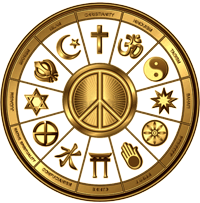 This statement by Maurice Nicoll points out exactly what is at stake:
This statement by Maurice Nicoll points out exactly what is at stake:
The philosophical teachings that can elevate a person to a higher spiritual level through guidance, methods, and exercises repeatedly become buried under misinterpretations and misunderstandings by unrefined individuals. This happens either intentionally or unintentionally. History repeatedly shows that people are inclined to manipulate important scriptures (shastras), simplify them, or make them more complex, driven by various motives. The primary reason for this is the identification with teachings and the pretense of fully understanding them, claiming to have already realized many aspects. The fact is that they have not yet been realized, leading to a rewritten, diluted, and distorted version of the teachings. Esoteric teachings often consist of various aspects, making them susceptible to alterations, especially by ‘initiates’ who are attributed the status of ‘expert’ by followers. This identification with status feeds into the dilution and distortion of esotericism.
All monotheistic religions speak of God in some (yet factually indeterminate) form and under some name, but none can explain the concept of ‘god’ in such a way that everyone agrees.
The term ‘religion’ has a much-discussed etymology tracing back to Latin. Two main etymologies can be mentioned: religare and religere, where the first refers to a connection with our divine inner source and the second is aimed at praising an external divine source.
Lama Tsultrim Allione once said, “the search for an external god has led humanity astray.” This viewpoint stems from the idea that the true essence of the Absolute, or the divine, is not found outside but within the human being. By focusing on an external God, humanity loses contact with its inner spiritual source and subjects itself to dogmas, rituals, and structures that can even hinder a direct experience of the divine. Instead, the focus should be on developing self-reflection, conducting inner inquiry, and practicing exercises and contemplation to discover the divine presence within us. This leads to a deeper understanding of one’s own divine (non-dual) nature and to an experience of enlightenment or liberation.
Head and Heart
There are two aspects to consider when it comes to understanding esoteric knowledge: that of reason and that of the heart. You could also say that of the philosopher and the monk.
Our reason enables us to understand and interpret general principles and specific teachings within esotericism, and then recognize them in our own experiences. Our ‘head’ is thus an important tool for achieving an esoteric religious experience. If our reason cannot comprehend esoteric principles, inner development will not be possible. Our reason must also affirm our inner development from its own intelligence.
Our ‘heart’ allows what we can recognize and understand with our reason to gain a deeper foundation. It provides the essential emotional grounding for what is ‘understood.’ A good method for jointly arriving at insights is the Socratic dialogue.
Our heart, on the other hand, knows only two words: yes and no. If the heart does not say yes to esoteric principles, which then require study and practice, no process will begin, and there can be no real inner development. The most important emotional component of the heart—besides a blossoming love for the divine Absolute—is devotion. Our reason alone cannot lead us to inner liberation; at least a great deal of devotion from our heart is necessary. This devotion is also reinforced by our reason in recognizing and shaping the discipline required for inner development. Thus, ‘head’ and ‘heart’ complement each other as a ‘team’ to realize the necessary determination in our actions that keeps our inner development going.
Without practicing esotericism through ‘doing and refraining’ in our daily lives, we get stuck in theories and mindsets or in devotion through identification with empty rituals. We see that an equal effort of head, heart, and hands is necessary to achieve self-realization, exactly what esoteric religion, and of course the philosophy of the Fourth Way, asks of us. The study of truth from our intellect, devoted dedication from our heart, and wise action ‘without expectation’ can then be seen as the trinity that brings us ever closer to spiritual self-realization.
Pure or Obsessive Devotion
The devotion of its followers is visible in every form of religion. And if there is no true (esoteric) knowledge about a religion, that devotion can have the most terrible consequences. We are then talking about fanatical psychopathic-driven devotion or obsession. From the complete unconsciousness built upon identifications within a religion now only understood exoterically, the most horrific crimes can be committed. Examples of this are numerous throughout history (from the total oppression of peoples to the detonation of suicide vests). Here, the heart’s devotion has turned into blind obedience to misunderstood dogma. But that too can be called devotion. Therefore, devotion must always be monitored by our highest intelligent discernment (Buddhi) and loving heart (Conscience). And this can only happen in a vigilant self-reflection: of remembering ourSelf.
The rationalization of forms of religion can also lead to much misery. Reason, in unconsciousness, is capable (no matter how intelligent) of conceiving, building, and institutionalizing the most horrific dogmas, and imposing them as coercion on believers. Such dogma is deadly for esotericism and can make a religion dictatorial. There are many historical examples of this, and even today, there are religious institutions (sects) responsible for much injustice and suffering inflicted on (enslaved) followers. It is therefore clear that in this lost state of head and heart, no inner development is possible. Thus, ‘religion’ has nothing to do with the original ‘reconnecting’ of our individual soul with the divine.
It is clear that almost every mainstream religion is now focused on worshiping or invoking an external god. The divine search and address within ourselves have virtually or completely disappeared in the major world religions. What people do to each other, all over the world, in the name of
‘faith’ in their own god is shocking and, unfortunately, has been the case throughout history. Many wars and inquisitions have been fueled and driven by (state) religions. It is evident that the majority of humanity has completely lost the esoteric path, and almost no one realizes that the exoteric path actually leads to division among people. But also within ourselves, because the concept of an exoteric (all-controlling and governing) God can bring about very unpleasant psychological misconceptions that can significantly affect a person. Spiritually speaking, the world religions are, therefore, mostly as dead as a doornail, as evidenced by the political and utterly godless (politico-religious) madness displayed worldwide, historically, but certainly also at this moment.
“`
But even so, esoteric seeds of wisdom can still be found in the world’s religions, for those who search deeply, and these are still practiced by small sects/movements. Since every religion has its roots in esoteric principles, these can still be found in the original mystical and spiritual aspects. Here are some examples:
Christianity
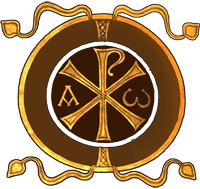 Within Christianity, various esoteric movements exist that practice mystical and spiritual aspects of the faith. These movements may have different teachings and practices, but they often share the pursuit of spiritual growth, enlightenment, and a deeper relationship between humans and the divine Absolute Source. Some of the most well-known are:
Within Christianity, various esoteric movements exist that practice mystical and spiritual aspects of the faith. These movements may have different teachings and practices, but they often share the pursuit of spiritual growth, enlightenment, and a deeper relationship between humans and the divine Absolute Source. Some of the most well-known are:
Gnosticism: various early Christian movements that regarded secret knowledge (gnosis) as the path to salvation. Gnosticism is based on the idea that the divine spark within humans must be freed from the material to return to the divine origin.
Hermeticism: based on the Hermetic writings attributed to a mythical (non-historical) figure: Hermes Trismegistus. These writings contain philosophical and spiritual teachings and statements about the nature of God, the universe, and the soul. They have had a significant influence on primarily Western esoteric traditions. See box below.
Christian Mysticism: there is a wide range of mystical traditions within Christianity, including the mysticism of the Desert Fathers and medieval mystics like Meister Eckhart. Christian Mysticism focuses on the inner experience of God and the union of the soul with the divine reality.
Additionally, while Kabbalah is originally a Jewish mystical tradition, it has also influenced Christian esoteric movements, especially in the Middle Ages. Kabbalistic teachings include complex symbolism and mystical interpretations of the Hebrew Bible.
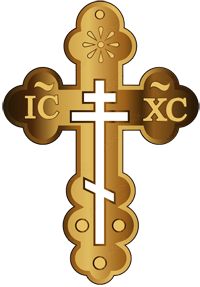 Although Orthodox Catholicism adheres strictly to orthodox doctrines, liturgy, and tradition without deviation, esoteric traces can also be found within it that offer the possibility of a more direct esoteric (divine) experience. So, besides the predominant perception of an external God, there is also some internal seeking. Some of these movements are:
Although Orthodox Catholicism adheres strictly to orthodox doctrines, liturgy, and tradition without deviation, esoteric traces can also be found within it that offer the possibility of a more direct esoteric (divine) experience. So, besides the predominant perception of an external God, there is also some internal seeking. Some of these movements are:
Hesychasm: a spiritual tradition within the Orthodox Church that focuses on inner silence, contemplation with the aim of realizing a direct inner experience of God. Hesychastic practices consist of repeated prayers and cultivating inner peace.
Orthodox Mysticism: within the Orthodox Church, there have been many holy men and women known for their deep mystical experiences and spiritual insights. These mystics have left writings that testify to their inner journey and their union with the divine reality, such as the works of the monks of Mount Athos. They are essentially quietists like Gregory Palamas, and saints like Symeon the New Theologian who wrote influential treatises on spirituality.
Philokalia: a collection of writings with teachings and practices aimed at achieving inner purity, contemplation, and spiritual growth. A spiritual mystical ‘guide’ within the Orthodox faith.
Judaism
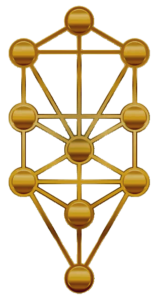 The term Judaism (Yahadut) is derived from the name Judah (Yehuda).
The term Judaism (Yahadut) is derived from the name Judah (Yehuda).
The esoteric core of the Jewish faith is represented by the Kabbalah, a mystical tradition that explores deeper (hidden) spiritual truths within the Torah. Kabbalistic teachings involve complex symbolism and mystical interpretations of the Hebrew Bible.
Zohar: (the Book of Enlightenment) is the best-known work within the Kabbalah, containing mystical interpretations of the Torah, and was written by the 13th-century Spanish Rabbi Moshe de León.
Sefirot: Ten divine emanations that form the Tree of Life, symbolizing spiritual development and the relationship between God and humanity. Reincarnation (Gilgul) is part of Kabbalistic doctrine, allowing the soul to learn through multiple lifetimes to attain spiritual liberation. Learning is viewed as an interactive process; asking questions and exploring answers helps one reflect at a deeper level and come closer to the core of truth.
Chevruta: This is a learning concept in which one studies and discusses texts together through questioning. This approach resembles the Socratic dialogue, as each partner challenges and encourages the other to analyze and engage in self-reflection. Kabbalists assume that sacred texts contain multiple layers of meaning. While Socratic dialogues begin with ethical or philosophical concepts, Kabbalistic dialogues start with questions about the divine mystery (the nature of God) and Creation. Through such dialogue, Kabbalists seek enlightenment within the mystical, a quest similar to the pursuit of wisdom in Socratic dialogue.
The Kabbalah influenced Christian esoteric movements, particularly during the Middle Ages.
Hinduism
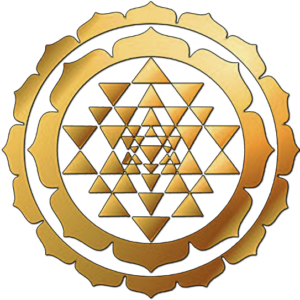 Within Hinduism, there are both esoteric and exoteric practices (such as the worship of gods), with the esoteric focusing on deeper spiritual initiation and the inner experience of the Self. These esoteric practices are aimed at inner enlightenment and self-realization, holding that the divine is something within each individual rather than external. Hinduism seeks to transcend the world of illusion and to experience a deeper truth.
Within Hinduism, there are both esoteric and exoteric practices (such as the worship of gods), with the esoteric focusing on deeper spiritual initiation and the inner experience of the Self. These esoteric practices are aimed at inner enlightenment and self-realization, holding that the divine is something within each individual rather than external. Hinduism seeks to transcend the world of illusion and to experience a deeper truth.
Advaita Vedanta: This non-dualistic philosophy asserts that there is only one ultimate reality, Brahman (God), and that all forms of duality are illusions (maya). The esoteric practice includes meditation and contemplation to break through the illusion of the ego (the individual self) and to experience that everything, in essence, is One. Or rather: not-two: advaita. The teachings of Advaita Vedānta, the Vedic doctrine, and the Upanishads are leading in this.
Yoga: This traditional path of yoga extends beyond what is commonly known as yoga today (assuming physical postures) and includes disciplines focused on transcending the ego and duality. Raja Yoga (Royal Yoga) and Jnana Yoga (Yoga of Knowledge) are examples, where meditation and knowledge are used to see through the illusion of the individual self and to achieve unity with the divine within.
Kriya Yoga, popularized by yogis like Paramahansa Yogananda, is an esoteric form of yoga that combines various breathing techniques (pranayama) to achieve spiritual transformation. Its practice focuses on raising awareness by directing life energies to specific energy centers (chakras), promoting inner stillness and divine unity.
Tantra: Within Hinduism, Tantra encompasses a range of mystical rituals and meditations aimed at exploring and enhancing inner energy flows (such as kundalini). Through specific rituals, mantras, and meditation exercises, one learns to connect directly with the divine and the cosmos. The energy of kundalini is seen as a dormant divine force at the base of the spine, which is awakened through Tantric practice to reach spiritual enlightenment.
Bhakti: Although bhakti often appears exoteric (through devotion to deities such as Vishnu, Shiva, or Kali), it also has esoteric layers. Bhakti emphasizes an intimate, inner connection with the divine without focusing on a specific deity. India’s mystical poet-saints, such as Mirabai and Kabir, taught that bhakti is a practice to experience the divine directly and deeply, beyond external forms.
Mantra and Yantra Meditation: In this practice, specific mantras and geometric figures (yantras) are used to focus and still the mind and enter deep meditation. A well-known example is the Sri Yantra, a powerful geometric symbol used to deepen the connection with the cosmic feminine principle and to experience the universe as one harmonious unity.
Buddhism
 Within Buddhism, there are, in addition to recitations and meditation practices, methods similar to Socratic dialogues, which involve the exploration of truth and wisdom. Although the Socratic method is specific to Western philosophy, there are similarities with the approach within Buddhist traditions. Besides meditation and recitation, Buddhism also uses the repeated asking of questions to develop insight and expand the mind. Although these practices are not identical to the Socratic method, they similarly involve critical thinking, self-examination, and the exploration of life and human experience. This is expressed in various methods and practices such as:
Within Buddhism, there are, in addition to recitations and meditation practices, methods similar to Socratic dialogues, which involve the exploration of truth and wisdom. Although the Socratic method is specific to Western philosophy, there are similarities with the approach within Buddhist traditions. Besides meditation and recitation, Buddhism also uses the repeated asking of questions to develop insight and expand the mind. Although these practices are not identical to the Socratic method, they similarly involve critical thinking, self-examination, and the exploration of life and human experience. This is expressed in various methods and practices such as:
Satsang: gatherings where spiritual teachers answer students’ questions and engage in dialogues on spiritual topics. It is similar to a Socratic dialogue (usually by asking questions to the teacher), where the focus is also on exploring the mind and the nature of reality.
Dharma Talks: these are sessions where teachers and students come together to discuss the teachings of the Buddha (dharma) and how to apply them in daily life. An interactive and dialectical approach to collectively reflect on the meaning of these teachings.
Koans: Within the Zen tradition of Buddhism, koans are used, paradoxical questions or statements that challenge our logic and push our minds beyond rational thinking. The practice of koans takes place in the teacher-student relationship, where dialogues are used to develop deeper understanding.
Islam
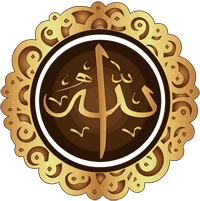 Within Islam, too, esoteric traditions and movements exist that delve deeper into the mystical and spiritual aspects of the religion. Islam is the ‘youngest’ of the existing (state) religions, and the teachings of Mohammed The most well-known esoteric movement is known to us as Sufism.
Within Islam, too, esoteric traditions and movements exist that delve deeper into the mystical and spiritual aspects of the religion. Islam is the ‘youngest’ of the existing (state) religions, and the teachings of Mohammed The most well-known esoteric movement is known to us as Sufism.
Sufism: focuses on inner experiences, spiritual growth, and again the pursuit of a direct experience of God, called Allah. This is referred to as the ‘inner journey’ or ‘the search for God in the heart’. Sufi masters teach that humans have an inner dimension where God can be directly experienced in a deep spiritual connection, through inner purification, self-reflection, meditation, and prayer. The Arabic term for this esoteric aspect of Islam is Tasawwuf.
Dhikr: in these group ceremonies, God’s names and sacred verses are recited, and meditation and musical rituals are practiced.
Tariqa: a spiritual path within Sufism with methods, teachings, and practices to achieve spiritual enlightenment. In sama gatherings, Sufis listen to religious music (instrumental or with vocals) to enter a state of ecstasy, thus coming closer to a divine experience. The whirling dervishes are quite well-known. They practice this whirling dance training to control emotions, but also to evoke ecstatic states (to music) in which intense emotions are expressed.
Although most practices within Sufism are focused on spiritual exercises and meditation, there is also reflection and dialogue. Informal conversations between teachers and students, as well as more structured gatherings, resemble Socratic dialogues. In these, deep conversations are held about spiritual and philosophical aspects of Islam. In sharing insights and experiences, a deepening of self-reflective awareness occurs. Just like Socratic dialogues, they stimulate intellectual growth (of reason), allowing wisdom to develop and self-knowledge to deepen. It strengthens the more cognitive relationship with Allah.
Sufi masters emphasize the importance of cleansing the heart of worldly desires and selfishness, to make room for the presence of the divine within us, and to understand universal love, compassion, and unity with all creatures. “Allah is closer than our own jugular vein” is a well-known saying of the prophet Mohammed.
Sufism has produced many great Sufi mystics and poets, of whom Rumi is the most famous. It is focused on esotericism and is thus the counterpart of the more exoteric Islam with its dogmatic rituals and legislation that has long led to much violent misery.
How is the world doing?
For most people in the world, the concept of God is deeply rooted in cultural, religious, and also spiritual backgrounds. Although secularism is increasing in Western-oriented countries, we can observe everywhere that God, as a valuable ‘higher’ concept, is anchored in humanity, in, for example, speeches, oaths, movies and TV series, sports, and so on. This always concerns an exoteric view of God.
However, the increase in secularism brings with it a kind of ‘collateral damage’ in the form of an increase in hedonism. Someone with a hedonistic attitude sees pleasure, enjoyment, and individual prosperity as the highest good and the most important goal in life. This can be harmful to others if this lifestyle is selfishly pursued on a large scale without considering what this lifestyle means for others. It leads to harmful or unethical behavior. People with strong hedonistic behavior are therefore literally and figuratively ‘godless’.
We find secularism much less in Eastern countries, where exoteric state religions are even gaining power. In these theocracies, governments are heavily influenced by religious leaders (and laws) and thus act as the executive authority of that religion. It is evident that this brings a lot of misery. Different exoteric state religions also combat each other, leading to various senseless and degrading wars.
In the vast majority of Western countries, however, a kind of confessionalism prevails, in which religious institutions do indeed influence the state but do not have full control as in a theocracy. Nevertheless, religious beliefs and institutions play a prominent role in political matters. Israel and the United States are good examples, where a ‘godless’ president will never come to power. But India can also be seen in this way, as the degrading religious caste system is maintained by politics.
The ideal would be for people (and countries) to adopt and practice the ethical philosophy of utilitarianism. Here, the value of actions and policies is determined by how much they contribute to the total happiness or well-being of everyone. However, there are no countries where utilitarianism is the dominant philosophy of government. It is used as a guideline to evaluate policy (based on the policy’s effects on general well-being), but this is done very pragmatically, meaning that some groups of people are always left out and overlooked. The Netherlands is such a country.
Although utilitarian principles influence political thinking and decision-making, there is no country that officially functions according to utilitarianism. A country that focuses entirely on minimizing lack and suffering instead of maximizing wealth and comfort. A country where reducing pain and suffering is morally more important than promoting pleasure and prosperity.
A purely philosophically driven political commitment in this area would only be possible in a country where individual esoteric awareness is stimulated by the state, including in education. Such a country would probably be led by an enlightened ‘despot’, but they have unfortunately been extinct for a very long time, if they ever existed at all.
So:
Across the entire spectrum of beliefs and religions, God varies from a personified omniscient entity outside of us, who is the creator and ruler of the universe and governs everything for better or worse, to an abstract universal Source of creation and consciousness within us: a force, energy, or quality inherent in all things.
Hermes Trismegistus
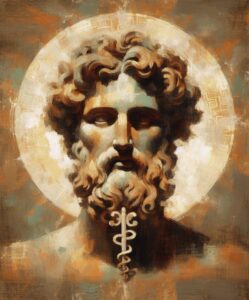 Hermes Trismegistus was a mythical figure and the author of many Hermetic texts, the Hermetica. Since he is a mythological and thus non-historical figure, Hermes Trismegistus does not have a specific period in which he lived. The texts and traditions attributed to him, the Corpus Hermeticum, however, originated in various periods.
Hermes Trismegistus was a mythical figure and the author of many Hermetic texts, the Hermetica. Since he is a mythological and thus non-historical figure, Hermes Trismegistus does not have a specific period in which he lived. The texts and traditions attributed to him, the Corpus Hermeticum, however, originated in various periods.
These writings include philosophical, religious, and magical works that provide fundamental insights into the nature of the universe, the mind, and the divine. The Hermetica have profoundly influenced Western esoteric traditions, including alchemy, astrology, and theosophy.
The teachings of Hermes Trismegistus emphasize the unity of all things, the divine origin of humanity, and the importance of spiritual knowledge and transformation. His ideas have had a lasting influence on classical, Renaissance, and modern esoteric thinkers.
He is considered a combination of the Greek god Hermes and the Egyptian god Thoth, and thus as a great philosopher, priest, and teacher of esoteric knowledge.
Hermes Trismegistus is a ‘syncretic‘ figure combining elements of both Hermes and Thoth. Both gods, Hermes and Thoth, were messengers (teachers) of divine knowledge. Hermes Trismegistus combines these roles and is therefore seen as a great teacher of esoteric wisdom.
His name Trismegistus means Thrice Greatest or Thrice Exalted, indicating his status as a total master of wisdom and mystical knowledge.
Part of the Hermetica is the Tabula Smaragdina, the Emerald Tablet, which consists of a series of 13 propositions containing profound wisdom and principles.
In the Hermetica, the nature of God / the Absolute is described in many premises emphasizing Its infinite, eternal, and omnipresent nature. They serve to deepen the understanding of the cosmos and humanity’s place within it.
“All monotheistic religions are based on one divine source…
Then yours can’t be different from mine, right?”
Watch/listen to the WijsDom podcast on
‘The Harsh Reality behind Religious Division’
© Michiel Koperdraat
In the translation of these Hermetic principles, God is always mentioned as the subject. However, the concept of God has been quite misused in several religions. For this reason, Zelfkennis.nu has replaced the term God with the Absolute, as a neutral, more philosophical, and less biased designation of the Supreme.
The Absolute is limitless, for nothing preceded It that could define Its boundaries; nothing encompasses It other than the Absolute itself.
The Absolute is undefined, for nothing preceded It that could define It.
The Absolute is invisible, for no one has ever seen It.
The Absolute is indescribable, for no one has succeeded in describing It
The Absolute is eternal, for the Absolute exists eternally, and there is no time in which the Absolute was not.
The Absolute is immeasurable, for there is nothing outside It to measure It other than the Absolute itself.
The Absolute is nameless, for no one preceded It to name It
The Absolute is invisible to the senses but visible in the mind.
The Absolute is unchangeable, for there is nothing that can change It.
The Absolute is omnipresent, for the Absolute is everywhere and everything exists within It.
The Absolute is incomprehensible, for Its essence transcends human understanding.
The Absolute is the Truth, for the Absolute is the source of all truth.
The Absolute is the Creator, for everything that exists is created by It.
The Absolute is wisdom, for Its knowledge is infinite and all-encompassing.
The Absolute is immeasurable light, pure, holy, and clean.
The Absolute is neither finite, nor blissful, nor divine, but transcends all of this entirely.
The Absolute is the eternal Truth and the eternal Love, and no one can know It but the Absolute itself.
The Absolute is the Creator of heaven and earth, and of all living beings.
The Absolute is the eternal Law and the eternal Order. Everything that exists, exists in It and through It.
The Absolute is the All, and nothing exists outside It.
The Absolute is the eternal Source of all life and light.
The Absolute is the Source of all knowledge.
The Absolute is the eternal Love and eternal Wisdom.
The Absolute is the Omnipresent and the Omniscient.
The Absolute is the Source of all goodness and all beauty.
The Absolute is the Source of all Light and Power, everything that exists, exists through It.
तत् त्वम् असि
Tat tvam asi
That is you
